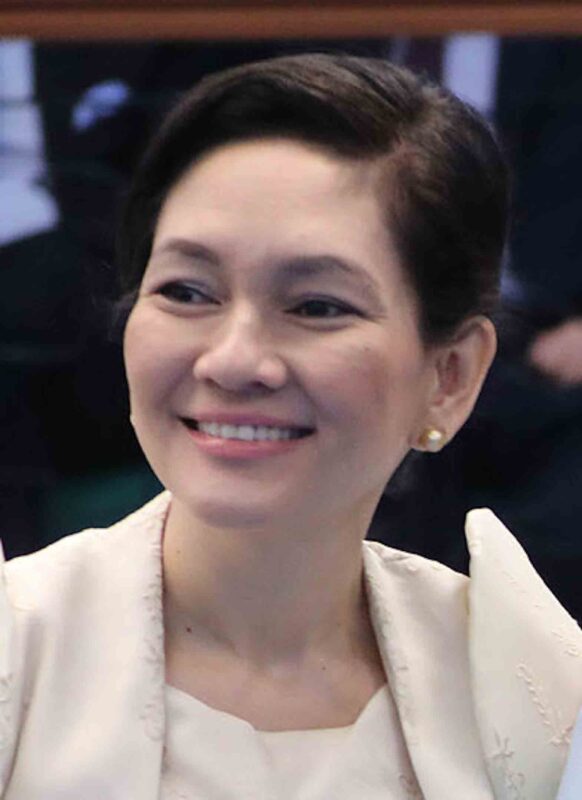NEW YORK—On a recent trip to the East Coast, Philippine Senator Risa Hontiveros met with different groups of Filipinos, in private as well as in town halls, one of which I attended. The senator is known for her progressive policies and for her role as a stalwart in the opposition to the Marcos administration. Articulate, friendly, Senator Hontiveros held forth on a number of issues affecting the current state of the Philippines, refreshingly sans double speak and flowery language that is too often the trademark of the traditional politician, or trapo, the abbreviated term that is also a double entendre, referring unflatteringly to a rag used for cleaning. The senator is decidedly and thankfully un-trapo.

Senator Hontiveros held forth on a number of issues affecting the current state of the Philippines, refreshingly sans double speak and flowery language that is too often the trademark of the traditional politician. WIKIPEDIA
On the return to power of the Marcoses, she pointed out that the family has always “played the long game,” quickly learning from their losses and thus better prepared for the next electoral challenge. She went to say that the opposition, shocked by the apparent—apparent, due to credible allegations of cheating— landslide win of BongBong Marcos (BBM) last year, has learned its lesson: not “to prepare just seven months before,” as was the case in the 2022 presidential election, but “right after elections end.”
Asked about the pivot of BBM towards the US, in contrast to former president Rodrigo Duterte’s cozying up to China, Hontiveros stressed that this renewed alliance should be markedly different from its previous iteration, that it be a relationship between equals and that the aim should be a bigger alliance not just with the US but with other like-minded nations. There is ASEAN, of course, but it is an organization hardly known for its leadership role.
You may also like: Marcos: ICC welcome only if ‘system collapses’ or ‘we have war’
With regard to the victims of former president Rodrigo Duterte’s drug war, very little progress has been made in securing convictions for the perpetrators of extrajudicial killings, or EJKs. There have only been two cases resulting in the convictions of four policemen, out of an estimated 30,000 deaths. She mentioned the Hague-based International Criminal Court’s ongoing investigation of the Duterte’s administration’s culpability in the drug war and the attendant human rights abuses, including that of the Philippine National Police. In response, in 2019, Duterte had the Philippines withdraw from the ICC. Nonetheless, the Court can still investigate alleged crimes against humanity committed in the years during which the Philippines was a member.
In this regard, BBM has continued to oppose the ICC’s probe, repeating his predecessor’s argument that the court lacks jurisdiction over a sovereign nation such as the Philippines and that moreover the in-country judicial system is fully capable of investigating such alleged crimes. Marcos Jr’s support for his predecessor’s brutal war on drugs is not surprising, given that the vice-president is Sara Duterte, the former president’s daughter and avid champion of her dad’s war. Besides, Marcos Sr. had his own notorious record for salvagings, as EJKs were referred to during his dictatorial rule—which the son always refers to as a “golden age.”
BBM seeks to portray himself and his government as more moderate, attuned to human rights, declaring at a meeting with President Biden in March that he was committed to “fight impunity” and investigate crimes, including those committed in the Dutertean drug war.
One victim of that drug war has been Senator Leila de Lima, who has been imprisoned for six years now, on clearly trumped-up charges of being involved in drug trafficking—charges brought against her by the Duterte government as she had persistently been critical of the drug war, aimed primarily at the poor. At the meeting I attended, Senator Hontiveros was hopeful that De Lima would finally be released the next day.
Alas, it was not to be: On Wednesday June 7, Manila Regional Trial Court Presiding Judge Romeo Buenaventura denied de Lima’s bail application, stating, “This court is convinced that there is great probability that the crime charged has been committed and that the accused are the agents thereof.” Hopes had been high for bail, as de Lima had been cleared in two other drug-related cases when key witnesses recanted their allegations against her.
In the meantime, since last June, when BBM took office, the killings have continued—more than 300, based on research by a University of the Philippines-backed organization, Dahas, that keeps track of drug-related killings.
Asked about the state of the underground armed opposition, Hontiveros pointed out that, since the demise of Jose Maria Sison, founder and chairman of the Maoist Communist Party of the Philippines (CPP), and the deaths of other leaders of the New People’s Army (NPA), and the National Democratic Front (NDF), the movement has been taking stock on how to move forward. The senator hopes that under new leaders, “their united front policies will be genuine, where all are equals at the table, and not as before,” referring to the dominance of the CPP-NPA-NDF in an earlier incarnation of a united front, where disagreement was barely tolerated, if at all.
She also pointed to the deadly practice of “red-tagging,” wherein critics of the regime are, without any evidence at all, linked to the communist underground. Thus tagged, activists are subjected to arrest, detention and even assassination at the hands of vigilantes. According to Carlos Conde of Human Rights Watch in the Philippines, BBM hasn’t disavowed red-tagging. Nor is he likely to: Vice-President Duterte helps lead the government’s anti-communist task force.
Thus do this and other deadly practices continue, honed over the decades. Plus ça change, plus c’est la même chose.
Copyright L.H. Francia 2023

